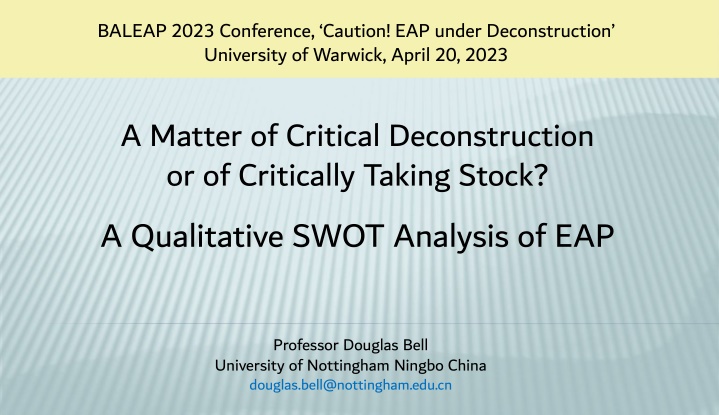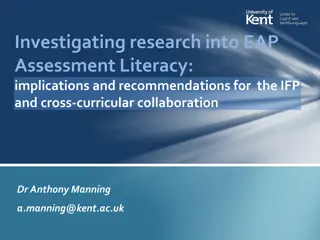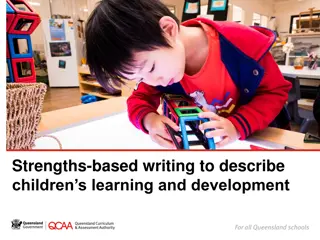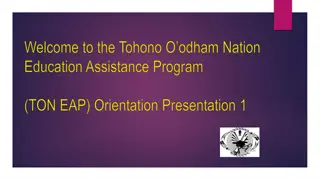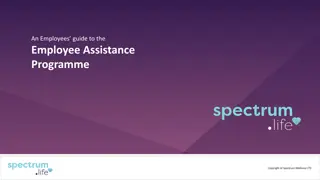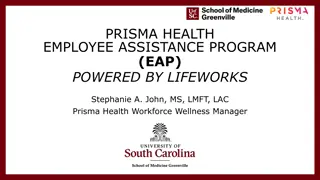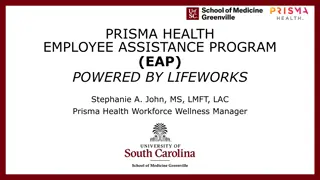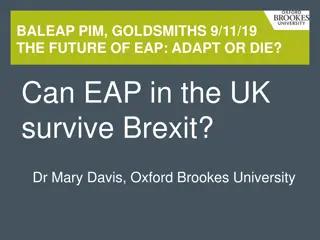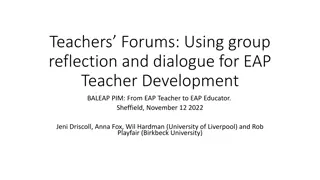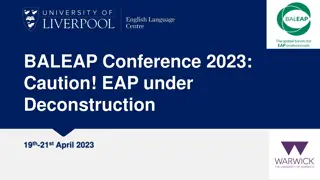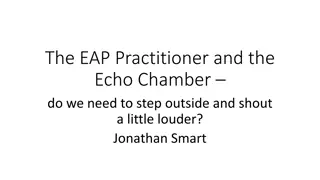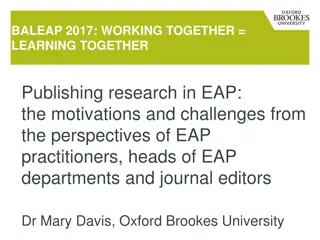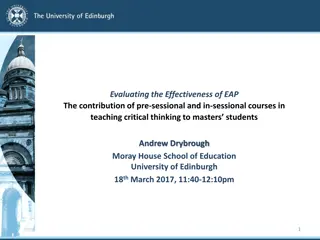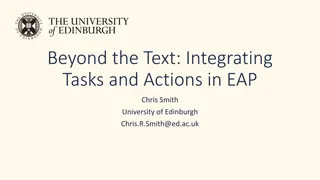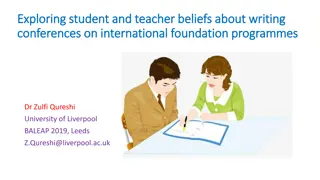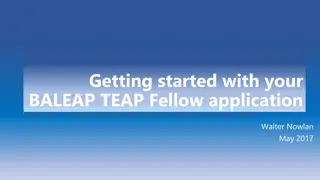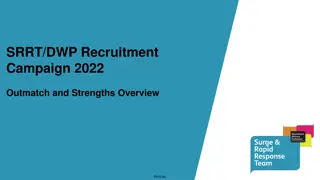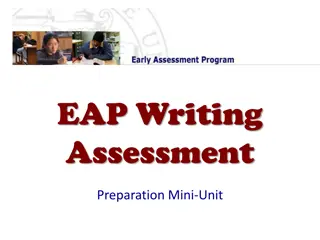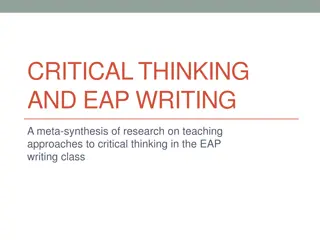Critical Analysis of the Evolution and Strengths of EAP: BALEAP 2023 Conference Insights
Delve into the evolution of English for Academic Purposes (EAP) through a qualitative SWOT analysis by Professor Douglas Bell. Uncover the growing demand for EAP, enhanced scholarly dissemination, and widened research scope. Explore the professionalization of EAP, influenced by organizations like BALEAP, as it navigates future challenges and opportunities for continued growth and excellence.
Download Presentation

Please find below an Image/Link to download the presentation.
The content on the website is provided AS IS for your information and personal use only. It may not be sold, licensed, or shared on other websites without obtaining consent from the author.If you encounter any issues during the download, it is possible that the publisher has removed the file from their server.
You are allowed to download the files provided on this website for personal or commercial use, subject to the condition that they are used lawfully. All files are the property of their respective owners.
The content on the website is provided AS IS for your information and personal use only. It may not be sold, licensed, or shared on other websites without obtaining consent from the author.
E N D
Presentation Transcript
BALEAP 2023 Conference, Caution! EAP under Deconstruction University of Warwick, April 20, 2023 A Matter of Critical Deconstruction or of Critically Taking Stock? A Qualitative SWOT Analysis of EAP Professor Douglas Bell University of Nottingham Ningbo China douglas.bell@nottingham.edu.cn
Presentation Overview Why this topic? A few personal perspectives Strengths, Weaknesses, Opportunities & Threats Some lessons from history but are they being learned? What does the future hold? Some (as yet) open questions
Why this topic? A few personal perspectives 35 years now in ELT; around 25 of them spent in EAP PhD thesis: Practitioners, Pedagogies and Professionalism in English for Academic Purposes (EAP). The Development of a Contested Field (Bell, 2016) New book: English for Academic Purposes: Perspectives on the Past, Present and Future (Bell, 2023) A genuine and sustained personal interest in EAP s history and ongoing developmental trajectory
Strengths One of the strengths is that there s an ever-increasing demand for EAP Another strength would be that more Masters degrees in TESOL and Applied Linguistics are now including modules on EAP and on teaching EAP than they used to. This means that EAP scholarship is becoming better known and more widely disseminated That should definitely be a good thing These modules on Masters programmes in TESOL expose students to EAP scholarship; those students are going to become English teachers; some of them are going to become EAP teachers so it raises their awareness of EAP scholarship; it raises their awareness of things like needs analysis; it raises their awareness of disciplinary differences; it raises their awareness of the importance of co-operation with subject specialists when designing EAP programmes. All of this is good in disseminating knowledge and scholarship. Those are the main strengths that I see (an interview respondent from 2023) EAP has enjoyed significant international expansion
Strengths EAP has considerably widened its scope In terms of strengths, I certainly do think that EAP research anyhow has broadened its interest enormously, especially since the early days. And I think that places like the UK are very lucky to have an organisation like BALEAP because it pulls everyone together and it s really great to have that because I guess it provides a connection for a lot of people, which of course they haven t got in other parts of the world. It certainly does something for professionalisation (an interview respondent from 2023)
Strengths EAP now has its own professional organisations, its own meta-language, its own journals and conferences, its own big names , its own recognition schemes and accreditation mechanisms EAP has become a much more theoretically grounded and research-informed enterprise in recent years, sitting at the intersections of applied linguistics, education, and the sociology of scientific knowledge specialist expertise, focused practices, areas of inquiry, scholarly approaches and the paraphernalia of journals, monographs, conferences, and research centres: all the trappings, in fact, of a full-fledged educational practice (Hyland, 2018, p. 389) EAP has arguably come of age
Weaknesses Working for the disciplines rather than with them In the disciplines, they seem to think that you re just the grammar guy (an interview respondent from 2016) There isn t an obvious route into [EAP], and therefore [ ] you have to ask yourself: is it a profession? [laughs] So I think [ ] it would help us to have a clear sense of who we are and how do you get to be an EAP teacher [ ]. If there s actually a path which someone could take deliberately, it might bring in more people who want to be EAP teachers rather than people who just stumbled upon it. (an interview respondent cited in Lowton, 2020) A continuing lack of clearly posted entry routes into the profession
Weaknesses I think teachers of EAP within the institute were seen as lower down the pecking order EAP teachers were never seen as full academics in the same way as other colleagues were (an interview respondent from 2016) Comparatively low status in the academy My feeling is that in a lot of UK institutions, there s still a massive gap between the academic members of a Faculty and the EAP tutors who are not very well-supported; who are working often on different contracts and who have umm, very different working conditions A lot of EAP practitioners are not given enough recognition within the academy you re always having to establish the fact that teaching is a legitimate area to be interested in . There is a real problem with status and people just being treated differently (an interview respondent from 2016)
Weaknesses Over my lifetime, EAP s professional status has been my biggest disappointment; the fact that there is hardly anybody who becomes a professor in EAP. This is particularly true, I think, in England. I know of a few, but they re pretty hard to find. There are very few who manage to do that and that s pretty well always been true and it s not getting any better. In fact, it may even be getting worse (an interview respondent from 2023) Comparatively low status in the academy There s the continued low status of EAP. And connected to that, there s the fear that university management will outsource EAP because of the cost benefits to them. And of course, what happens then is that EAP teachers contracts become more inferior even than they currently are and EAP teachers are seen even more as outsiders to the academy. And they re seen as doing a job which just anybody who speaks English can do... (an interview respondent from 2023)
Weaknesses A disconnect between ELT qualifications/credentials and what EAP requires of practitioners the qualifications most typically asked for by recruiters are still generic ELT qualifications, such as the DELTA and/or Masters in subject areas such as TESOL and Applied Linguistics. As neither of these qualification types have preparation for EAP teaching fore-grounded as their main learning objective, it therefore remains quite possible for someone to get a job as an EAP teacher while never having studied anything about the subject. This has always struck me as highly problematic. (Bell, 2023)
Weaknesses A disconnect between ELT qualifications/credentials and what EAP requires of practitioners What goes on in an EAP class is different to what goes on in a General English class (an interview respondent from 2016) I think with EAP, you re trying to be quite precise about what your learning outcomes are. In ELT, it seems to me that that s not always the case...It s looser. It is more fluid. I see EAP as more focused and more, umm, outcomes-driven (an interview respondent from 2016)
Weaknesses A disconnect between ELT qualifications/credentials and what EAP requires of practitioners They talk about feeling de-skilled because it seems to them that their previous experiences of English teaching are no longer required in EAP. They worry about being able to understand the ideas and texts in the disciplines their students are entering. (Alexander, 2009 cited in Post, 2010, p. 26) There is a tendency to think of teaching as a matter of going through certain procedures and using certain techniques. But what I think they often, if not always, fail to do, is to get prospective teachers to an understanding of what it is, what it means to communicate in a language; what does it mean to use language for a particular purpose? (an interview respondent from 2016)
Weaknesses Poor job stability and a lack of upward career progression With some of the new contracts that are being offered to younger people, I mean, they re not even bottom steps on the ladder anymore because there s just no obvious ladder above them to climb up. (an interview respondent from 2023) I still get the feeling that EAP is a pretty precarious area to be working in. I mean, lots of jobs that I see and hear about in e-mails or whatever seem to be only summer based rather than all year-round. I think the precariousness of the whole situation is a problem and that s probably a major issue really that s facing the field, I would say. (an interview respondent from 2023)
Weaknesses A widening gap between research and practice the majority of EAP practitioners are not researchers or authors of journal publications, at least in the UK (Davis, 2019, p. 73) Most EAP teachers do not have a research expectation as part of their job description, and may never get a grant, other than perhaps a small local one, for research into the issues they face in their teaching (Hamp-Lyons, 2015, A3)
Weaknesses A widening gap between research and practice I ve stopped reading anything other than only very occasionally, the table of contents of the EAP and ESP journals because, umm, I find the subject matter of the articles to be so, err, how can I put it, umm, specialized, and generally much more to do with advanced aspects of language analysis, rather than anything else. I mean err, yes, all of that s got its place, definitely, but I think there should be a much more central concern with methodology really, and with pedagogy in general I mean, there s no point in knowing about some rarefied aspect of English, if you lack a good understanding of how to put that knowledge over in the classroom; so, I think that a good understanding of classroom methodology must definitely come first and foremost. I think a lot of the time, we ve got things the wrong way round basically [laughs] There s been an inversion of the real priorities. (an interview respondent from 2016)
Weaknesses A widening gap between research and practice Given that most of the people involved in EAP work as teachers, rather than as pure researchers, one would expect there to be significantly more scholarly interest in teaching. The apparent lack of such professional interest is both puzzling and disconcerting. It also compares rather unfavourably with the situation in other language teaching contexts, notably TESOL, where mainstream journals such as TESOL Quarterly and the ELT Journal do evidently still manage to attract research papers focusing more directly on what happens in the classroom. (Bell, 2023) Bell, D.E. (2022). Methodology in EAP: why is it largely still an overlooked issue? Journal of English for Academic Purposes, 55, https://doi.org/10.1016/j.jeap.2021.101073
Opportunities Widening the scope of EAP/making EAP open to ALL students/possibly forging stronger links with Academic Literacies Sharing our expertise in pedagogy with those new to HE Producing and publishing more research on EAP teaching as a practice Getting more involved in inter-disciplinary work
Threats A worrisome withering on the vine of TEAP qualifications Neo-Liberal Attitudes to Higher Education The Steady Proliferation of Private EAP Providers Political Changes Around the Role & Status of English The Enduring Online Legacies of Covid The Rise of Artificial Intelligences
Some lessons from history but are they being learned? Lesson 1: Safeguarding the supply of new practitioners In a prescient article from 1983, Jack Ewer highlighted the need for more teacher training in the domain of English for Science and Technology and the shortage of qualified practitioners which this was then precipitating. In the case of ESP in general, the training and development baton was then picked up by several institutions, which duly started offering Masters courses with specialisms directly in ESP. In the case of EAP, however, this does not yet appear to be the case In UK higher educational contexts at least, it seems that the idea of dedicated Master s programmes in EAP has simply not taken off. What longer-term effects this will have, and what it suggests for the future academic stability and longevity of EAP as a field remains to be seen. (Bell, 2023)
Some lessons from history but are they being learned? Lesson 2: Deepening Practitioner Awareness & Knowledge of the Field I would like [there to be] a greater awareness of the history of thinking about EAP. What I m struck by always is the way in which there seems to be a disregard, or an ignorance, of what has happened before in our field I suppose what I would want EAP people to think about is where they come from, and what the history of EAP has been, and how it relates to the current developments Personal communication with Prof. Henry Widdowson, 2013
Some lessons from history but are they being learned? Lesson 3: Gaining Academic Recognition & Improving Practitioner Status We must face up to the fact that as long as we are a Masters rather than a Doctoral level specialization, we will have problems being recognised within tertiary institutions. The importance of the PhD, or for that matter, of any kind of specialized on-paper qualification, cannot be overestimated. There is a yawning chasm between the A.B.D. ( all but dissertation doctoral student) and the person who holds a PhD Although people who have a Masters level qualification in ESL have specialized skills and are appropriately qualified for teaching English at tertiary level, we must work to bring the qualification of the ELT professional up to a PhD level, or else settle for being second-class citizens in a society of PhDs. (Pennington, 1992, pp. 15-16)
What does the future hold? Some (as yet) open questions Will EAP be able to achieve full academic status, or it will it be even further relegated to the position of an outsourced service provider? Will EAP as a discipline be able to reduce its permeability and better safeguard its professional knowledge boundaries? Will EAP continue to develop beyond the academy? Will EAP as a discipline become more rounded and show as much professional interest in the who and the how as it hitherto has in the what ? How will EAP be impacted by advances in artificial intelligence? How will EAP continue to be impacted by global economic, social and political events?
A Closing Observation The educational world is currently in a considerable state of flux, with very few of the traditional certainties. While the jury may still be out on whether EAP faces a bright or a gloomy future, for me personally, one perspective is crystal clear: if they are to remain one step ahead of the emerging challenges, those involved in the management and delivery of EAP would be well-advised to keep their eyes very firmly on the ball. (Bell, 2023)
References Alexander, O. (2009). Understanding EAP context-Teaching English Blog. http://www.teachingenglish.org.uk/blogs/olwyn- alexander/understanding-eap-context Bell, D.E. (2023). English for Academic Purposes: Perspectives on the Past, Present and Future. Channel View Publications Bell, D.E. (2022). Methodology in EAP: why is it largely still an overlooked issue? Journal of English for Academic Purposes, 55, https://doi.org/10.1016/j.jeap.2021.101073 Bell, D.E. (2021). Accounting for the troubled status of English language teachers in Higher Education. Teaching in Higher Education. https://doi.org/10.1080/13562517.2021.1935848 Bell, D.E. (2016). Practitioners, Pedagogies & Professionalism in English for Academic Purposes: the Development of a Contested Field. Unpublished PhD Thesis. University of Nottingham UK. Davis, M. (2019). Publishing research as an EAP practitioner: Opportunities and threats. Journal of English for Academic Purposes, 39, 72-86. Hamp-Lyons, L. (2015). The future of JEAP and EAP. Journal of English for Academic Purposes, 20, A1-A4. Hyland, K. (2018). Sympathy for the devil? A defence of EAP. Language Teaching 51(3), 383-399. doi:10.1017/S0261444818000101 Lowton, R. (2020). The (T)EAP of the Iceberg: The Role of Qualifications in Teaching English for Academic Purposes. Unpublished MA TESOL diss., University of Nottingham Ningbo China. Pennington, M.C. (1992). Second Class or Economy? The Status of the English Language Teaching Profession in Tertiary Education. Prospect, 7(3), 7-19. Post, D. (2010). The transition from teaching General English to English for Academic Purposes: an investigation into the challenges encountered by teachers. Unpublished MA diss., University of Bath, UK.
Thank you for Listening A Matter of Critical Deconstruction or of Critically Taking Stock? A Qualitative SWOT Analysis of EAP Professor Douglas Bell University of Nottingham Ningbo China douglas.bell@nottingham.edu.cn
